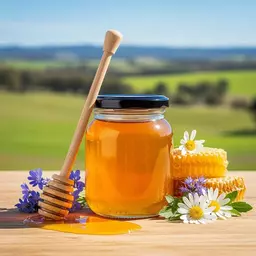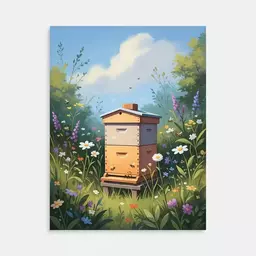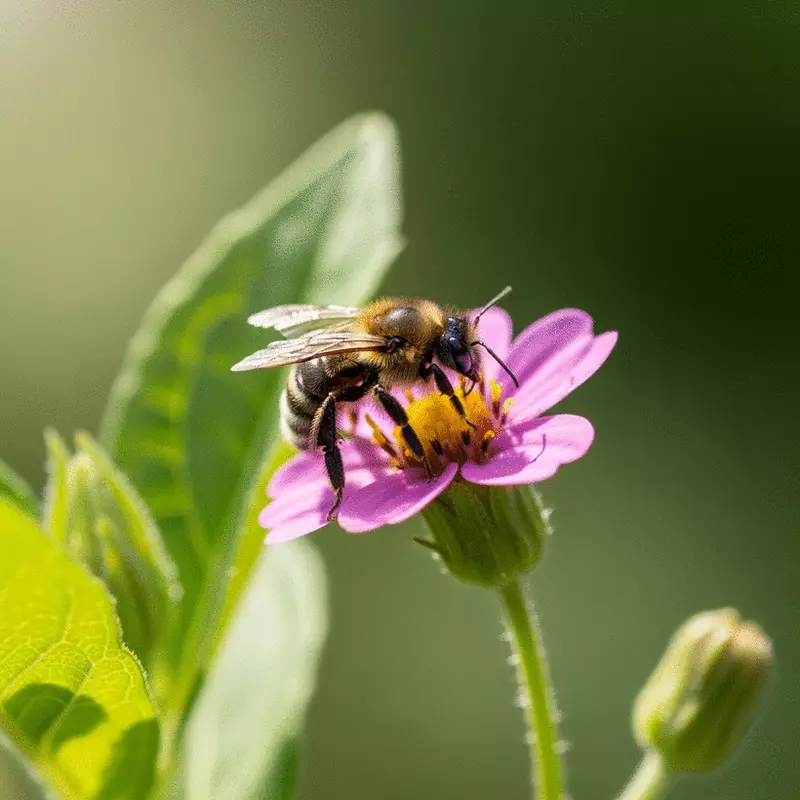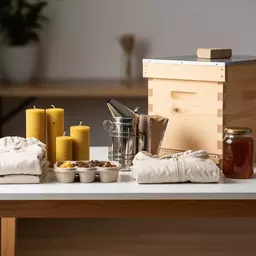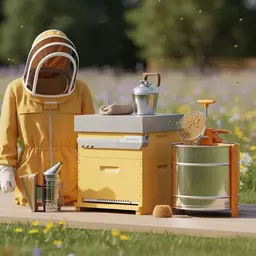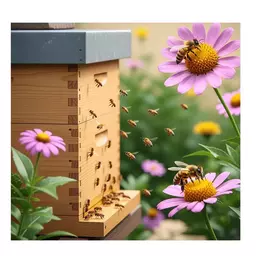Apiary Equipment Trends for 2025
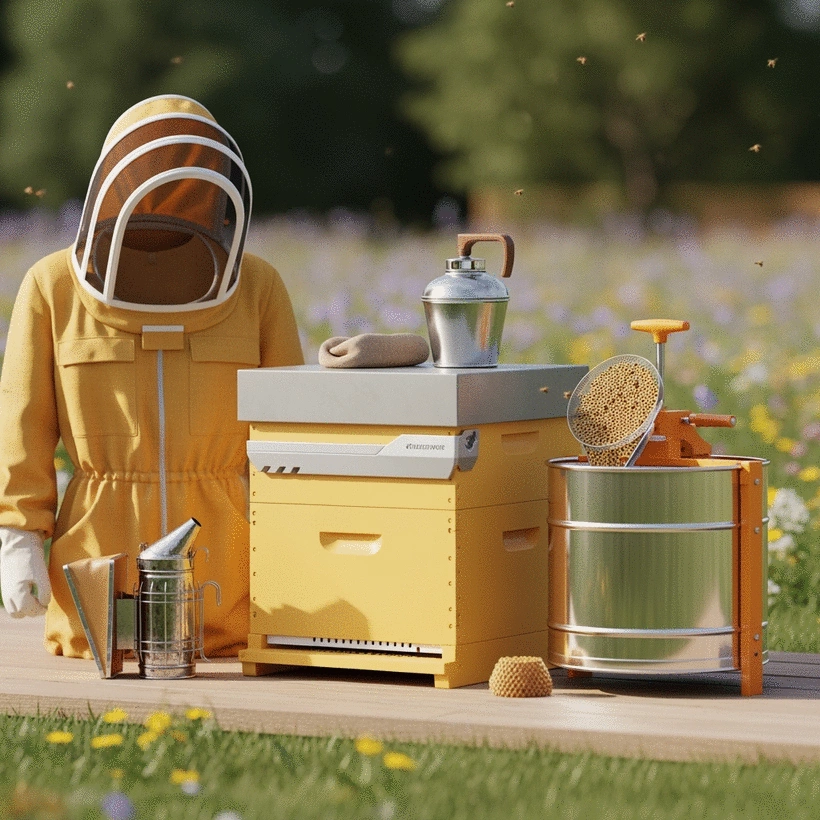
As the world of beekeeping evolves, understanding apiary design becomes vital. How can thoughtful layout and innovative equipment enhance the health and productivity of honey bees? Here's a quick look at the key lessons that will shape your beekeeping journey in 2025.
What You Will Learn
- Well-planned apiary designs promote bee health by reducing stress and encouraging natural behaviors.
- Integrating technology, such as smart hives, enhances hive management and monitoring.
- Urban beekeeping requires optimization of space and noise management for effective hive placement.
- Upgrading to modern equipment can significantly improve hive productivity and overall beekeeping success.
- Understanding local regulations is essential for setting up compliant and safe apiaries.
- Investing in a honey extractor boosts efficiency, honey quality, and yield for beekeepers.
Key Considerations for Modern Apiary Design & Equipment (2025)
This visual highlights essential aspects of apiary design, equipment trends, and purchasing considerations to support bee health and productivity.
Why Apiary Design Matters
- Promotes Bee Health
- Improves Hive Management
- Encourages Pollination
Essential for thriving pollinators.
Key Equipment Trends (2025)
- Smart Hives (Remote Monitoring)
- Modular Design (Customizable)
- Eco-Friendly Materials (Sustainable)
Innovation for efficiency & sustainability.
Urban Beekeeping Considerations
- Space Optimization (Vertical)
- Noise Management (Placement)
- Legislation Awareness (Local Laws)
Adapting to city environments.
Informed Purchasing Decisions
- Research Brands & Reviews
- Consider Apiary Size Needs
- Durability & Sustainable Materials
Smart investments for long-term success.
Understanding the Landscape of Apiary Design for 2025
As we step into 2025, the world of beekeeping is evolving more rapidly than ever! Apiary design is becoming a crucial aspect of maintaining healthy and productive hives. At Nectar Network, I’ve always believed that a well-planned apiary not only enhances hive productivity but also creates a welcoming space for our buzzing friends. Let's dive into why apiary design matters in modern beekeeping, along with the key trends and considerations shaping this exciting field.
Why Apiary Design Matters for Modern Beekeeping
Apiary design is not just about aesthetics; it plays a critical role in ensuring the health and well-being of honey bees. An effective layout can significantly reduce stress on the bees and improve their foraging efficiency. Here are some key reasons why thoughtful apiary design is essential:
- Promotes Bee Health: A well-designed space minimizes disturbances and promotes natural behaviors.
- Improves Hive Management: Easy access to hives allows for better monitoring and quicker responses to issues.
- Encourages Pollination: Strategic placement of flowering plants can enhance pollination rates in surrounding areas.
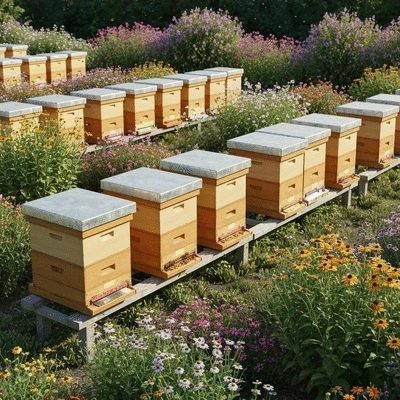
When I first started beekeeping, I learned the importance of these principles firsthand. A thoughtful apiary layout can make all the difference in how well our bees thrive. Plus, it gives us a chance to connect with nature right in our backyards! For more insights on optimizing bee health, check out our guide on Best Honey Extractor Reviews.
Key Trends Shaping Apiary Equipment in 2025
The next wave of beekeeping is marked by innovative equipment tailored to meet the needs of both hobbyists and professionals. Here are some noteworthy trends to watch:
- Smart Hives: The integration of technology into hive management is on the rise, allowing beekeepers to monitor hive conditions remotely.
- Modular Design: Customizable bee habitats that adapt to changing environmental conditions are gaining popularity.
- Eco-Friendly Materials: Sustainable materials are becoming a standard in hive production, aligning with our mission at Nectar Network to promote conservation.
These trends not only enhance the efficiency of beekeeping but also highlight the growing awareness of sustainability. As I explore new products, I always look for those that align with our commitment to protecting these vital pollinators.
Exploring Urban Beekeeping and Its Design Considerations
Urban beekeeping has blossomed in recent years, transforming rooftops and gardens into thriving bee havens. However, designing an apiary in an urban setting comes with its unique challenges:
- Space Optimization: Every inch counts in the city, so utilizing vertical space creatively can maximize hive placements.
- Noise Management: Urban environments can be noisy—considering hive placement away from loud sources helps reduce bee stress.
- Legislation Awareness: Urban beekeepers must stay informed about local regulations that can affect hive setups.

Being part of the urban beekeeping community has shown me the incredible adaptability of honey bees. By considering these factors, we can create safe, productive environments for our buzzing companions. It's exhilarating to see how cities are buzzing with life thanks to initiatives like these! If you're looking to explore more advanced beekeeping techniques, consider learning about different types of honey extractors.
Interactive Poll: Your Apiary Design Preferences
As we explore the exciting world of apiary design, we’d love to hear from you! What aspect of apiary design do you find most important for your beekeeping setup?
Summarizing Essential Apiary Products and Equipment for 2025
As we look towards 2025, it's crucial to assess our beekeeping setups to ensure they align with the latest trends and technologies. Upgrading your equipment not only supports bee health but also enhances your overall beekeeping experience. Investing in quality gear can lead to more productive hives and, ultimately, better honey yields!
At Nectar Network, we believe that understanding the essential products and equipment can make all the difference in your beekeeping journey. Let’s dive into what you need to consider when upgrading your setup.
The Importance of Upgrading Your Beekeeping Setup
Staying current with advancements in beekeeping technology is vital for the sustainability of your apiary. Upgrading your beekeeping setup can:
- Improve hive productivity by using modern hive designs.
- Enhance bee health with better materials and tools.
- Facilitate easier management through innovative equipment.
With the right upgrades, you can create a more efficient and healthier environment for your bees. It’s about fostering a community of thriving pollinators and a productive apiary!
How to Make Informed Purchasing Decisions for Your Apiary
When it comes to purchasing beekeeping equipment, it can feel overwhelming at times. However, there are a few key considerations that can help guide your decisions:
- Research different brands and read reviews from fellow beekeepers.
- Consider your specific needs based on the size of your apiary.
- Look for equipment that is durable and made from sustainable materials.
By evaluating these factors, you'll ensure that your investments are not only beneficial in the short term but also promote long-term health and productivity for your hives.
Understanding the Benefits of Investing in a Honey Extractor
A honey extractor is more than just a luxury item; it’s an essential tool for any serious beekeeper. Here are some compelling reasons to invest in one:
- Efficiency: Extractors allow you to harvest honey quickly while keeping the comb intact.
- Quality: They help maintain the quality of honey by minimizing handling and damage to the comb.
- Yield: Using an extractor can lead to higher yields, giving you more honey to enjoy or sell.
As you consider your beekeeping journey, think about how a honey extractor can enhance your overall experience. It’s a worthwhile investment that pays off in delicious honey!
Next Steps for Aspiring Beekeepers
Embarking on your beekeeping adventure is both exciting and overwhelming! But don’t worry, I’m here to help guide you through the next steps.
Exploring Local Regulations and Compliance for Beekeeping
Before diving into beekeeping, it's crucial to understand the regulations in your area. Here are some steps to follow:
- Check local laws regarding hive placement and bee species.
- Contact your local agricultural extension office for guidance.
- Stay informed about any permits or registrations required in your region.
By ensuring compliance, you’ll create a solid foundation for your new hobby while avoiding potential complications down the road!
Resources for Continued Learning and Community Support
Learning doesn’t stop after you start beekeeping! Engaging with ongoing education and community support is essential. Some valuable resources include:
- Online courses specific to beekeeping practices.
- Local workshops hosted by experienced beekeepers.
- Online forums for sharing experiences and getting advice.
At Nectar Network, we’re dedicated to fostering a community of learning and support around beekeeping, so don’t hesitate to reach out!
Joining a Beekeeping Association for Networking Opportunities
Joining a beekeeping association can significantly enrich your experience. Here’s why:
- Network with fellow beekeepers who share your passion.
- Gain access to exclusive resources and workshops.
- Participate in local events or honey shows to showcase your work.
Being part of a community not only provides support but also fuels your passion for beekeeping. So, what are you waiting for? Let’s connect and get buzzing! Discover more about setting up your apiary by comparing manual vs. electric honey extractors.
Frequently Asked Questions About Apiary Design and Equipment
- Q: Why is apiary design important for bee health?
- A: Thoughtful apiary design minimizes stress on bees, promotes natural behaviors, and improves overall hive management, directly contributing to healthier and more productive colonies.
- Q: What are the key equipment trends for 2025?
- A: Key trends include smart hives for remote monitoring, modular designs for adaptability, and eco-friendly materials for sustainable beekeeping practices.
- Q: What should urban beekeepers consider when designing an apiary?
- A: Urban beekeepers should focus on space optimization (e.g., vertical setups), noise management to reduce bee stress, and staying informed about local regulations and legislation.
- Q: How can upgrading beekeeping equipment benefit my apiary?
- A: Upgrading equipment can improve hive productivity through modern designs, enhance bee health with better tools and materials, and facilitate easier management of your colonies.
- Q: Is a honey extractor a necessary investment for beekeepers?
- A: For serious beekeepers, a honey extractor is highly beneficial. It increases efficiency in harvesting, helps maintain honey quality, and can significantly boost your honey yield.
Recap of Key Points
Here is a quick recap of the important points discussed in the article:
- Apiary Design Importance: Thoughtful apiary design promotes bee health, improves hive management, and encourages pollination.
- Key Trends for 2025: Smart hives, modular designs, and eco-friendly materials are shaping the future of beekeeping equipment.
- Urban Beekeeping Considerations: Optimize space, manage noise, and stay informed about local regulations for successful urban apiaries.
- Upgrading Equipment: Investing in modern tools enhances hive productivity and bee health, creating a more efficient environment.
- Informed Purchasing Decisions: Research brands, assess your needs, and prioritize durable, sustainable materials when buying beekeeping equipment.
- Community Engagement: Joining local associations and participating in workshops can enrich your beekeeping experience and foster connections.
